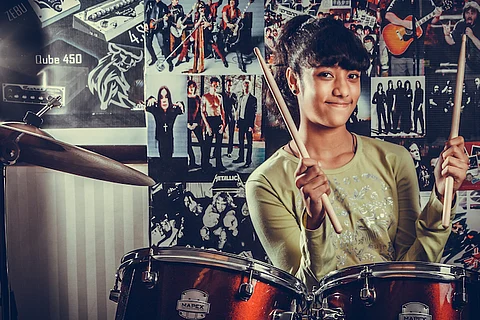

They didn’t exactly say no. Or words to that effect. Charu Hariharan would not call it discouragement. But there were those who spoke about the ‘lots of effort’ she’d need to put. There were also those who asked if she really needed to play percussion, couldn’t she just sing like most other girls. Charu heard them out, and at times doubted herself, but she persisted in her love for percussion. She is known today for her mridangam – a regular face at concert venues in Kerala, the smiling young performer at the stage corner. She’s travelled with it, made music of her own. And two weeks later, she will be one of the privileged few to play for the second edition of 'Women of Rhythm', held as part of the biggest percussion festival in India, Dumru.
“It is a long-time dream coming true. I have watched a lot of Dumru festivals and the importance they give to artistes,” Charu says, speaking to TNM in Thiruvananthapuram. Along with her will be six other women, from different parts of the country, playing for the festival to be held in Pune on June 21, World Music Day.
The Dumru Percussion Festival began in 2011 and took place in Pune every other year till it was taken to Mumbai in 2016. It became a well-known event. But it was only a little later that the organisers realised that they had not yet featured women in the festival. So in December 2016, that happened, the first percussion concert series featuring only women. And now, one and a half years later, it is happening again.
“If you go back a long time, to years before 1900, you’d find women were not allowed to play percussion. They weren’t allowed to pick up percussion instruments. They’d play what was considered ‘more feminine’ instruments like the piano or the violin. Or they’d dance and sing. At one time, entertainment meant women dancing,” says Aditya Prabhu, founder director of the Dumru Percussion Festival.
That began to change, he says, in the early 1900s when no one was ready to play percussion for women performers.
“So they began playing on their own. There was also a movement in western countries. But it all took years,” Aditya says. The organisers of the Dumru Festival didn’t want to take so long to bring a change, and decided to bring together women percussionists from across the world.
“We had the power of people with us. There were already thousands of people coming to watch the festival. And to these people, we wanted to showcase our women percussionists, to show that women could play them too and play them well. It was not to garner sympathy," he adds.
This was happening in other industries too, Aditya says. In Bollywood for instance, you’d find very few women musicians, while there were plenty of female singers. Women technicians were also very few.
“They didn’t take up those roads because those roads were never opened to them,” Aditya says.
For the Dumru Percussion Festival, they decided that at least 40 per cent of the act would be by women. And for 'Women of Rhythm' this year, they have identified seven percussionists, all young ones, from across the country. The youngest is Ananya Patil, aged 15, and the oldest is Savani Talwalkar, daughter of veteran percussionist Taalyogi Pt. Suresh Talwalkar.
“Since it is happening in Pune, we have chosen three performers from Pune, and four from the rest of the country," Aditya adds.
The series would be taken to other places – Mumbai, Bengaluru etc, and also to a few countries.
Mitali Khargonkar, one of the performers, thinks perhaps it comes from the physical challenges, the perception that it wasn’t suited for women. “The challenges begin from the point of lifting these instruments. It may look small but a tabla is heavy. But then once you begin performing, people are not going to look at your gender. If you play well, you’d be appreciated well,” she says. Mitali hails from a family of percussionists in Indore, and is a fifth generation tabla player, who has now moved to Mumbai.
But times are changing. Charu says that the discrimination is not as much now. She had faced it long ago, when she began learning to play the mridangam, but never from her guru, Mannarkoil J. Balaji.
But still, people have a tendency to exclude the names of women percussionists from programmes.
“Perhaps because we don’t get to socialise so much in these circles. But there were times when I wondered if I had not been good enough to be included. I can’t blame anyone here because this feeling starts from oneself. Once you know you are good, that you are able to play well and there need not be a segregation of male and female players, others will change their views too,” Charu adds.